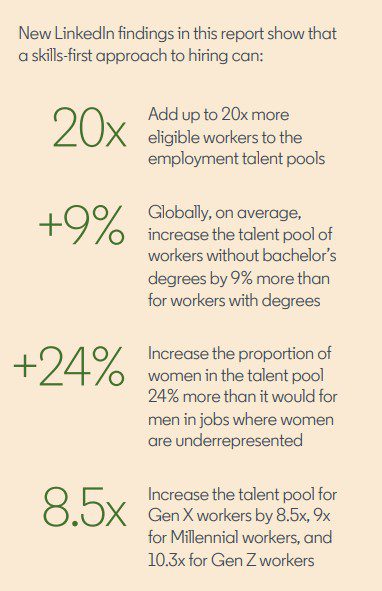Skills-focused hiring will solve talent shortages
Says LinkedIn.
Why You Should Care
Recruitment is broken.
It is too focused on degrees and job titles, rather than skills, according to LinkedIn.
Here's why a skills-based approach is the solution.
Globally, the labor market remains tight – skills shortages are widespread, and some sectors are still facing severe talent shortages.
According to LinkedIn research, the problem is that the labor market is full of missed opportunities – employers are struggling to hire the right candidates for their open roles, resulting in bad hires, which are extremely costly as they don’t help businesses thrive.
The core reason for these missed opportunities is that employers are still taking a traditional approach – they are focusing on degrees and job titles, aka experience – when they should hire (and promote) based on skills.
It is crucial to remember that skills aren’t just acquired in degrees, but in many different ways, such as online learning, certificate programs, apprenticeships, online learning and micro credentials.
At an event launching the research, Sue Duke, Head of Global Public Policy at LinkedIn, shared: “Skills are skills no matter how you acquire them”. She calls for organizations to move away from all sorts of questions about your experience, and focus on the one that does matter: “Do you have the skills to do this job?”
LinkedIn found that embracing skills-first hiring would drastically widen the access to talent pools – employers would have, on average, nine times more access to eligible workers.
This figure increases to 19 times in the US, 11 times in Spain and the Netherlands, and ten times in the UK and France. Germany sits comfortably at the global average, while the average across the European Union (EU) member states is six times.
Interestingly, the benefits are also particularly stark in the industries struggling most with talent and skills shortages – for instance, education (x22.5), retail (x14.6), administration and support services (x13.8) and healthcare (x11.8).
Importantly, skills-based hiring doesn’t just broaden the talent pool, but it diversifies and democratizes it. It makes jobs more accessible to traditionally marginalized groups, particularly those without degrees and women.
Plus, this skills-based approach benefits younger people; it helps them to flex and build resilience as the world of work continues to change, largely due to technology.

Credit: LinkedIn, Skills-First: Reimagining the Labor Market and Breaking Down Barriers report.
How to embrace skills-first hiring
Ultimately, for LinkedIn’s Sue Duke, by embracing a skills-first approach “we have the chance to reimagine the labor market and break down barriers, and to build a world where everyone has access to opportunity — not because of where they were born or whom they know or where they went to school but because of their skills and abilities”.
The question that remains is where should employers start?
LinkedIn calls on employers to really understand the skills they have in their organization – and what skills they need for the future. This involves breaking down every job role they have into skills – not a small task – and really thinking about the skills that every employee has.
The next thing is to embrace skills-based hiring, and taking job titles and degrees out of internal and external decisions. It is also important to think outside of the box around where you hire from – what transferable skills could people from different industries bring?
Finally, really dial in on employee learning and development. Make sure you are helping them develop their skills, and continue to thrive in their roles as they evolve and change in the future.
Of course, employers can’t do this alone. They need the support of policymakers – this is why LinkedIn’s event also hosted the EU Commissioner Jobs and Social Rights Nicolas Schmit.
He talked about how 2023 has been designated the European year of skills. This means that the EU Is putting skills center-stage, helping people get jobs and companies fill skills gaps, and ultimately making the region more competitive.
Skills are now the currency of work, but the closing message from Commissioner Schmit is that skills are also the new gold that can give opportunities to everyone.
Where the HR world meets. You can’t afford to miss out on UNLEASH World in Paris this October.

Senior Journalist
Allie is an experienced business journalist. She is UNLEASH's talent and recruitment lead.